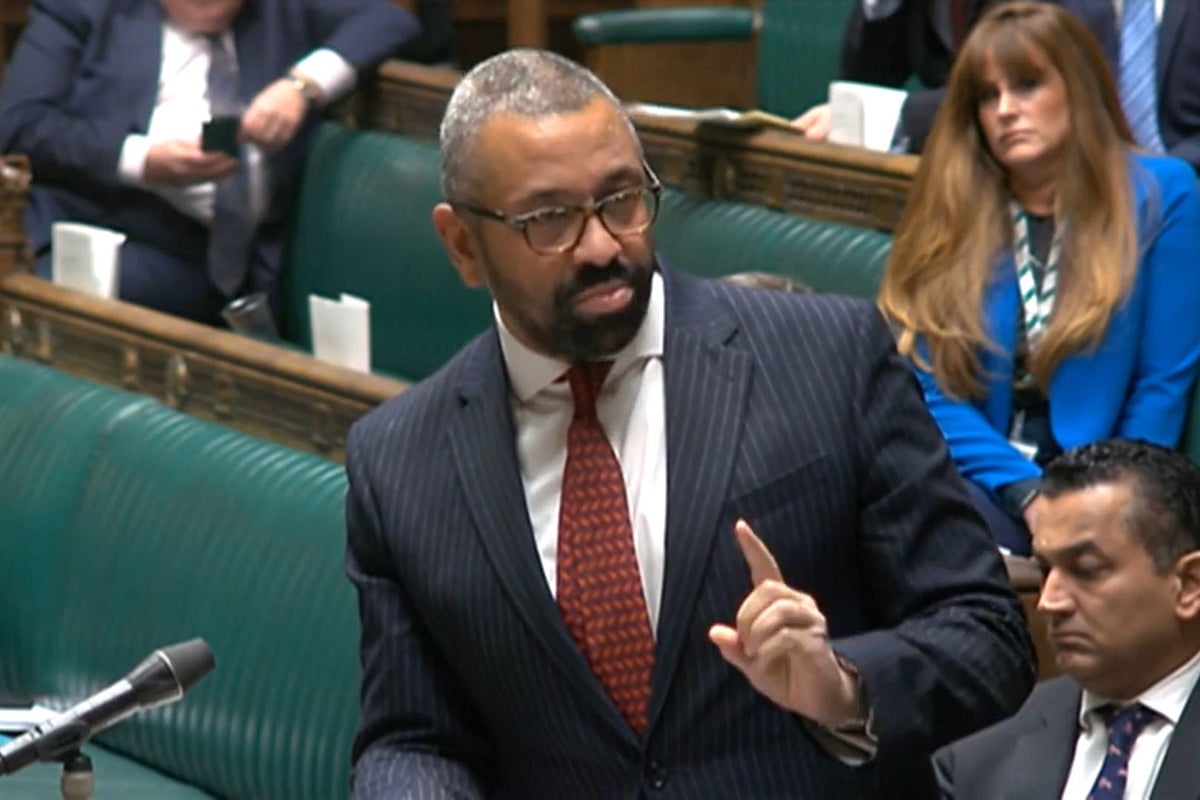
James Cleverly said he would not “prejudge” the content of the Government’s emergency legislation on its Rwanda scheme as Tory MPs sought assurances the Bill would allow for international treaties to be disapplied.
In his first Home Office questions as Home Secretary, the Cabinet minister faced calls from backbenchers for Parliament’s “sovereign will” to take precedence over agreements like the European Convention on Human Rights if necessary.
It comes after Mr Cleverly suggested the plan to deport asylum seekers to Kigali was not the “be all and end all” of the Government’s immigration approach following a Supreme Court judgment that ruled the scheme unlawful.
The Rwanda scheme is an incredibly important part of the basket of responses that we have— James Cleverly
Rishi Sunak’s plan to save the policy involves the signing of a new treaty with Rwanda and the introduction of emergency legislation allowing Parliament to deem the scheme safe, but this has been delayed.On Monday, Mr Cleverly was asked by Tory MP Jack Brereton in the Commons whether the necessary “legal exemptions” would be in place.
“The Rwanda scheme is an incredibly important part of the basket of responses that we have. I will do everything to ensure that we drive down small boat arrivals. That is the promise we have made to the British people and that is the commitment we will deliver,” the Home Secretary replied.
Co-chair of the New Conservatives grouping of MPs, Miriam Cates, welcomed the yet-to-be-published legislation and treaty but asked for assurances it would take “precedence” over “the interpretation” of international treaties.
“I can assure my Right Honourable Friend, the excellent working relationship we have with Rwanda… will give us the opportunity to have a treaty that addresses the issues in the Supreme Court judgment,” Mr Cleverly replied.
It’s right to ensure we have the strongest possible position because we want both the treaty and the Bill to have the best possible chance of success— Prime Minister's spokesman
Meanwhile, backbencher Simon Clarke declared his “profound conviction” that “disapplication of elements of the (ECHR) and the Refugee Convention will be necessary” to tackle the crossings of small boats in the English Channel.
“I don’t want to prejudge the content of the Bill. I’ve listened very carefully to the points that he made and he and the rest of the House should understand that we will do everything we can to ensure that we break the business model of the evil people-smugglers that he highlights, that we drive down small boat arrivals, and he is absolutely right the deterrent effect of Rwanda is a key element to that multi-strand approach.”
The deal on the asylum plan with Rwanda and emergency legislation intended to set aside the Supreme Court’s ruling the policy was unlawful were initially expected immediately after the verdict.
No 10 had said in the hours after the November 15 defeat that the deal would be laid before Parliament in the “coming days” so deportation flights could take off “as soon as possible”.
But on Monday, Downing Street declined to say whether the new legally binding pact with Kigali would be signed before the Commons rises for its Christmas recess.
The Prime Minister’s spokesman said: “It’s due to be published in the coming weeks.
“I think people understand that following the judgment, which was relatively recently, it’s right to ensure we have the strongest possible position because we want both the treaty and the Bill to have the best possible chance of success and that’s why we are focused on finalising these details.”
Immigration minister Robert Jenrick told MPs the law to help ensure the Rwanda deportation plan takes effect would be brought forward “shortly”.
He said: “So far this year we’ve reduced the number of these dangerous, illegal and completely unnecessary crossings by more than a third compared to last year, despite increases of nearly a third in Europe.
“Nevertheless, the numbers of illegal arrivals remain unacceptably high. We remain focused on delivering our comprehensive plan to stop the boats by breaking the business model of the people smugglers and will shortly be piloting emergency legislation through this House to ensure flights to Rwanda take off as a matter of urgency.”
With the Commons’ recess due to begin on December 19, there are not enough sitting days to ratify the treaty before the New Year under the current schedule, with No 10 saying at least 21 are required.
Mr Sunak’s spokesman also refused to comment on “speculation” about what the agreement will entail following reports Rwanda was refusing to sign a treaty that would include British officials’ involvement in its legal system.
The Government’s hope of sending asylum seekers who arrive in the UK on a one-way trip to Rwanda is a key plank of Mr Sunak’s pledge to “stop the boats”.
No 10 said on Monday the deal was “a crucial part of our approach to stopping the boats, but as we’ve always been clear, there is no one silver bullet”.







